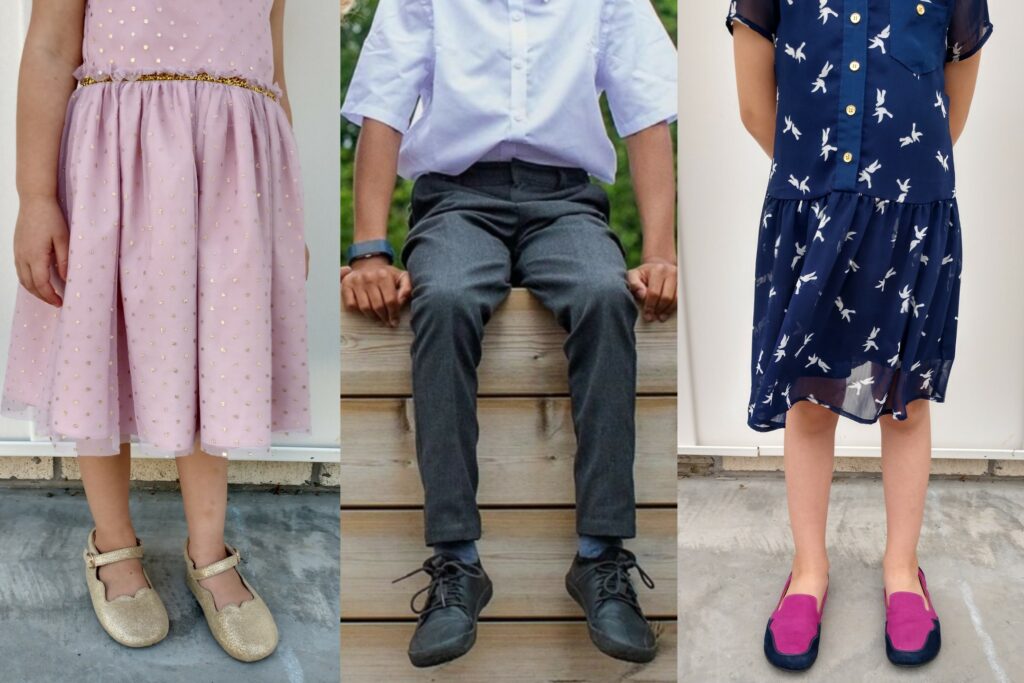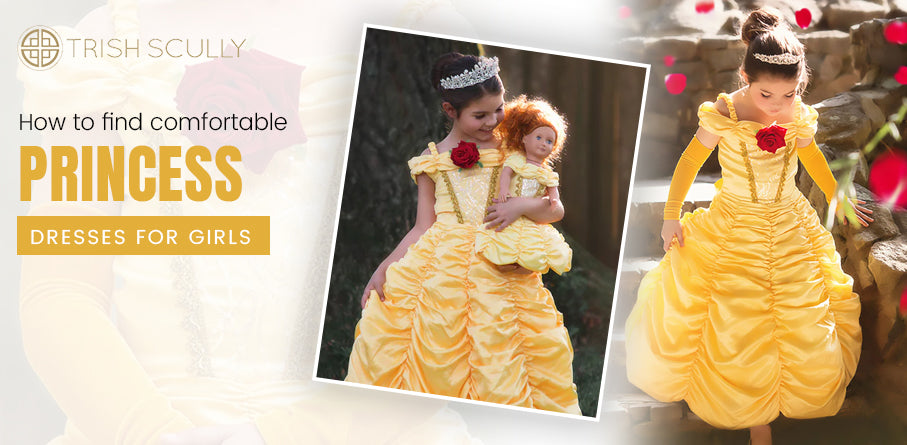To find comfortable kids’ dresses, prioritize soft fabrics and breathable materials. Check size charts and read reviews for fit and comfort.
Finding the perfect dress for children involves more than just style; comfort is essential. Kids need to feel free to move and play without restrictions. Soft, breathable fabrics like cotton and linen offer the best comfort. Consider the dress’s cut and design, as well, to ensure it allows for easy movement.
Pay attention to sizing; a well-fitting dress enhances comfort significantly. Look for features like adjustable straps or elastic waistbands, which provide flexibility. Reading customer reviews can also guide you to the best options. With these tips, you can choose dresses that keep your little ones happy and comfortable all day long.
Table of Contents
The Importance Of Comfort In Kids’ Clothing
Choosing comfortable dresses for kids is crucial. Comfort affects their mood, play, and overall happiness. Uncomfortable clothes can lead to distractions and irritability. Parents should prioritize comfort while shopping for kids’ dresses.
Balancing Style And Comfort
Parents want their kids to look great. Kids want to feel good. Finding a balance between style and comfort is essential. Here are some tips:
- Choose dresses made from soft, breathable fabrics.
- Look for flexible designs that allow movement.
- Check for adjustable straps and waistbands.
- Opt for simple styles without complicated fastenings.
Kids enjoy expressing themselves. Fun colors and patterns can make dresses appealing. Always ensure that style doesn’t compromise comfort.
Children’s Sensitivity To Textiles
Kids have sensitive skin. Certain materials can cause irritation or allergies. It’s essential to choose the right textiles. Consider the following materials:
| Material | Comfort Level | Common Use |
|---|---|---|
| 100% Cotton | Very Comfortable | Everyday Dresses |
| Polyester | Moderately Comfortable | Active Wear |
| Wool | Can be Itchy | Winter Clothes |
| Bamboo | Very Comfortable | Eco-Friendly Options |
Pay attention to labels. Look for hypoallergenic and non-toxic fabrics. Soft and breathable materials promote comfort. They allow kids to play freely without irritation.
Key Fabrics For Comfortable Kids’ Dresses
Choosing the right fabric is essential for kids’ comfort. The right fabric allows movement and feels soft against the skin. Some materials are better than others for children’s dresses. Here are key fabrics to consider.
Cotton And Its Benefits
Cotton is a popular choice for kids’ dresses. It is soft, breathable, and durable. Here are some benefits of cotton:
- Soft Texture: Gentle on the skin.
- Breathable: Keeps kids cool in warm weather.
- Durable: Lasts through rough play.
- Easy to Wash: Stains come out easily.
Cotton dresses are ideal for everyday wear. They are comfortable for both playtime and special occasions.
Avoiding Irritating Materials
Some fabrics can irritate sensitive skin. Avoid these materials for kids’ dresses:
- Polyester: Can trap heat and moisture.
- Wool: Often itchy and uncomfortable.
- Nylon: May cause sweating and discomfort.
Choose fabrics that provide comfort. Always check labels for fabric content. Happy kids wear dresses that feel good!
Sizing Matters: Ensuring A Good Fit
Finding the right size is key for kids’ dresses. A good fit ensures comfort and allows for easy movement. Children grow quickly, making sizing crucial. Let’s dive into how to measure your child accurately and understand their growth patterns.
How To Measure Your Child Accurately
Measuring your child correctly helps find the perfect dress size. Follow these simple steps:
- Gather Tools: Use a soft measuring tape and a notepad.
- Measure Height: Have your child stand straight against a wall. Mark the top of their head.
- Chest Measurement: Wrap the tape around the fullest part of the chest.
- Waist Measurement: Measure around the natural waist, just above the belly button.
- Hip Measurement: Measure the widest part of the hips.
Record each measurement. Compare these with the dress sizing chart. This ensures a comfortable fit.
Understanding Kids’ Growth Patterns
Kids grow fast. Knowing their growth patterns helps in choosing dresses. Here are some key points:
- Growth Spurts: Children may have sudden growth phases.
- Age Range: Size varies by age, but every child is unique.
- Regular Check: Measure every few months to track growth.
- Flexibility: Choose dresses with adjustable features for longer wear.
Growth patterns vary among children. Regular measurement keeps you updated.
Seasonal Considerations For Dress Comfort
Finding comfortable kids’ dresses involves understanding seasonal needs. Different weather calls for different fabrics and designs. This ensures your child stays happy and comfortable.
Summer Fabrics And Designs
Summer dresses should be light and breathable. Choose fabrics that allow air circulation. Here are some great options:
- Cotton: Soft and breathable, perfect for hot days.
- Linen: Lightweight and has a natural texture.
- Rayon: Smooth and cool against the skin.
Consider designs that promote comfort:
- Loose-fitting: Allows for easy movement.
- Short sleeves: Keeps arms cool.
- Bright colors: Reflect sunlight and add fun.
Winter Dress Options For Warmth
Winter dresses must provide warmth and comfort. Look for thicker fabrics that trap heat. Here are some suitable fabrics:
| Fabric | Benefits |
|---|---|
| Wool: | Warm and insulating. |
| Fleece: | Soft and lightweight. |
| Velvet: | Luxurious feel and adds warmth. |
Styles to consider:
- Long sleeves: Keeps arms warm.
- Layering options: Add warmth with cardigans or tights.
- Fun patterns: Brighten up gray winter days.
The Role Of Dress Cut And Design
Choosing the right dress for kids involves understanding cut and design. The way a dress fits can greatly impact comfort. Kids need to move freely while looking cute. Different styles offer various benefits. Let’s explore these options.
Loose Vs. Fitted Dresses
Dress fit plays a crucial role in comfort. Here’s a quick comparison:
| Type of Dress | Comfort Level | Best For |
|---|---|---|
| Loose Dresses | High | Playtime and Outdoor Activities |
| Fitted Dresses | Moderate | Special Occasions |
Loose dresses allow freedom of movement. They are great for playtime. Fitted dresses look nice for parties. Ensure they are not too tight. Comfort is key for happy kids.
Functional Design Features
Functional designs enhance comfort and usability. Here are some important features:
- Elastic Waistbands: These allow easy wear and comfort.
- Adjustable Straps: These provide a custom fit for growing kids.
- Pockets: Kids love pockets for storing treasures.
- Breathable Fabrics: Look for cotton or linen for warm days.
Choose dresses with these features. They make wearing dresses enjoyable. Happy kids mean happy parents.

Credit: Amazon
Practicality And Ease Of Movement
Finding comfortable kids’ dresses is essential for active play. Dresses should allow freedom of movement. Kids need to run, jump, and play without restrictions.
Choosing Dresses For Active Play
Pick dresses made from lightweight and breathable fabrics. Cotton and jersey are great choices. They keep kids cool and comfortable during playtime.
- Look for dresses with:
- Short sleeves or sleeveless designs
- Loose fits
- Elastic waistbands
- Consider dresses with:
- Fun prints
- Bright colors
- Easy-to-wear styles
Avoiding Restrictive Clothing
Restrictive clothing can limit movement. Choose dresses that allow kids to move freely.
| Type of Dress | Benefits |
|---|---|
| A-Line Dresses | Flowy and comfortable for running and playing |
| Shirtdresses | Easy to put on and take off |
| Maxi Dresses | Soft fabric and great for twirling |
Avoid dresses with tight bodices and stiff fabrics. These can cause discomfort. Always check for enough space in the armholes and waist.
Let kids express themselves through comfortable dresses. Practicality and ease of movement make playtime enjoyable.
Checking For Skin-friendly Closures
Choosing the right closures for kids’ dresses is crucial. Skin-friendly closures prevent irritation and discomfort. Kids deserve to feel relaxed while they play and explore. Let’s look at some common types of closures and their impact.
The Trouble With Zippers And Buttons
Zippers and buttons can cause problems for young children. These closures may pinch or dig into the skin. Kids often struggle to manage them on their own. This can lead to frustration and tears.
- Zippers can snag hair or skin.
- Buttons may be hard to fasten or unfasten.
- Some buttons are small and pose a choking hazard.
Always check how these closures sit against the skin. If they feel rough or sharp, they may not be suitable.
Safe Alternatives For Kids’ Dresses
Consider these skin-friendly options for closures:
| Closure Type | Benefits |
|---|---|
| Elastic Bands | Comfortable and easy to pull on and off. |
| Hook and Loop (Velcro) | Simple for kids to use independently. |
| Snaps | Fast and easy to secure without fuss. |
| Drawstrings | Adjustable for a perfect fit. |
These alternatives offer comfort and ease. They allow kids to dress themselves easily. No more struggling or irritation!

Credit: birdiebean.com
The Impact Of Laundry Care On Dress Comfort
Choosing comfortable kids’ dresses goes beyond style. Proper laundry care significantly affects how soft and cozy a dress feels. Fabrics can change after washing. Some may become stiff or lose their softness. Understanding how to care for these fabrics ensures lasting comfort.
Selecting Easy-care Fabrics
Opt for fabrics that are easy to care for. Here are some great options:
- Cotton: Breathable and soft. Ideal for everyday wear.
- Polyester: Durable and wrinkle-resistant. Keeps its shape.
- Blends: A mix of cotton and polyester. Combines comfort with easy care.
Fabrics with tags like “machine washable” are best. They save time and effort. Avoid delicate fabrics that require special care. Choose those that can withstand regular washing.
Tips For Maintaining Softness
Keep kids’ dresses soft with these simple tips:
- Wash in Cold Water: Cold water helps prevent fabric damage.
- Use Gentle Detergents: Choose mild detergents for sensitive skin.
- Avoid Fabric Softeners: They can coat fabrics and reduce breathability.
- Line Dry: Air drying keeps the fabric soft and fresh.
- Iron with Care: Use low heat to avoid burns and stiffness.
Follow these tips to keep dresses soft and comfortable. Happy laundry days lead to happy kids!
Incorporating Kids’ Preferences
Finding the right dress for your child can be a fun adventure. Kids have their own unique tastes. Understanding their preferences makes shopping easier and more enjoyable. Let’s explore how to involve them in the dress selection process and handle picky dressers.
Involving Children In Dress Selection
Encouraging kids to participate in choosing their dresses can make a big difference. Here are some tips:
- Ask for Input: Let them express their favorite colors and styles.
- Show Options: Present a few choices for them to pick from.
- Involve Them in Shopping: Take them with you for a fun shopping trip.
This involvement helps kids feel more confident in their choices. It also teaches them about decision-making.
Dealing With Picky Dressers
Some children can be very particular about what they wear. Here are effective strategies:
- Understand Their Preferences: Talk to them about what they like and dislike.
- Choose Comfortable Fabrics: Soft cotton or breathable materials are great options.
- Set Limits: Offer two or three options to avoid overwhelming them.
- Be Patient: Give them time to express their feelings about different dresses.
By respecting their choices, you help them feel valued. This approach can reduce fussiness during dress time.
Where To Shop For Comfortable Kids’ Dresses
Finding the right store for comfortable kids’ dresses can be fun and exciting. Many options exist for parents. Different retailers offer unique styles, sizes, and prices. Here are some great places to shop.
Recommended Retailers
- Target – Offers a variety of stylish and affordable dresses.
- Old Navy – Known for comfortable, casual options.
- Gap Kids – Features trendy and high-quality dresses.
- HM – Provides fun, colorful dresses at budget-friendly prices.
- Amazon – Wide selection with many brands to choose from.
Online Vs. In-store Shopping
Choosing between online and in-store shopping has pros and cons. Both methods offer unique benefits.
| Shopping Method | Advantages | Disadvantages |
|---|---|---|
| Online Shopping |
|
|
| In-Store Shopping |
|
|
Reading Labels And Understanding Symbols
Understanding labels and symbols helps you choose the best kids’ dresses. Labels provide important information. They tell you about fabric types and care instructions. Knowing this can lead to comfort and durability.
Deciphering Fabric Content
Fabric content affects comfort and wearability. Here are common fabric types:
- Cotton: Soft, breathable, and hypoallergenic.
- Polyester: Durable and wrinkle-resistant.
- Rayon: Lightweight and smooth.
- Linen: Cool and perfect for warm weather.
Check the label for fabric percentages. A blend of fabrics may provide extra comfort.
Recognizing Care Instructions
Care instructions are essential for maintaining the dress. Look for these common symbols:
| Symbol | Meaning |
|---|---|
| Machine wash or hand wash. | |
| Tumble dry or air dry. | |
| Can be ironed or not. |
Follow care instructions closely. This ensures the dress lasts longer. Kids can play freely in dresses that stay beautiful after washing.

Credit: anyasreviews.com
Allergies And Skin Sensitivities
Finding comfortable kids’ dresses involves considering allergies and skin sensitivities. Many children have reactions to certain fabrics and materials. Choosing the right dress can prevent discomfort and irritations.
Identifying Hypoallergenic Materials
Hypoallergenic materials are great for sensitive skin. Look for fabrics that reduce the chance of allergic reactions.
- Cotton: Soft and breathable, perfect for everyday wear.
- Bamboo: Naturally hypoallergenic and eco-friendly.
- Modal: Smooth and less likely to irritate skin.
- Linen: Lightweight and breathable, ideal for warm weather.
Check labels carefully. Avoid materials with harsh chemicals or dyes.
Avoiding Common Allergens
Some materials trigger allergies. Avoid these common allergens in kids’ dresses:
| Allergen | What to Avoid |
|---|---|
| Wool | Itchiness and irritation |
| Synthetic Fabrics | Causes skin rashes |
| Latex | Can cause allergic reactions |
Choose dresses free from these allergens. Always check for tags and labels.
Sustainability And Comfort
Finding the right balance between comfort and sustainability is essential for kids’ dresses. Eco-friendly choices benefit the planet and keep your child comfortable. Sustainable dresses often use soft materials that are gentle on the skin. They also promote a healthier environment for future generations.
Eco-friendly Fabrics
Choosing the right fabric is crucial. Eco-friendly fabrics offer comfort and durability. Here are some popular eco-friendly fabrics:
- Organic Cotton: Grown without harmful chemicals.
- Linen: Made from flax, it’s breathable and strong.
- Bamboo: Naturally antibacterial and very soft.
- Recycled Polyester: Made from plastic bottles, helps reduce waste.
These fabrics ensure your child stays comfortable all day. They also reduce the environmental impact of clothing production.
The Longevity Of Sustainable Dresses
Sustainable dresses last longer than regular ones. They withstand wear and tear. This longevity leads to less frequent replacements, saving money over time.
| Feature | Sustainable Dresses | Regular Dresses |
|---|---|---|
| Durability | High | Medium |
| Environmental Impact | Low | High |
| Comfort Level | High | Variable |
Investing in sustainable dresses is smart. They provide comfort, style, and eco-friendliness. Choosing durable options is beneficial for both kids and the Earth.
Expert Advice And Reviews
Finding the perfect dress for your child can be a challenge. Expert advice and genuine reviews make this task easier. They guide you toward comfortable and stylish options. Parents can save time and avoid mistakes with reliable information.
Consulting Fashion Blogs For Parents
Fashion blogs for parents offer valuable insights. They feature trends, tips, and product recommendations. Many blogs include:
- Style guides for different occasions
- Fabric recommendations for comfort
- Age-appropriate styles for kids
Look for blogs that focus on kids’ fashion. These experts often share:
- Personal experiences with brands
- Detailed dress reviews
- Fashion advice from industry insiders
Blogs like these can be a treasure trove of information. They help you make informed decisions about your child’s wardrobe.
Leveraging Customer Reviews
Customer reviews provide real feedback from other parents. Check out these platforms for honest opinions:
- Online retailers
- Social media groups
- Dedicated review sites
Focus on the following aspects in reviews:
| Aspect | What to Look For |
|---|---|
| Comfort | Soft fabric and fit |
| Durability | How well it holds up after washing |
| Style | How the dress looks on kids |
| Value | Is it worth the price? |
Read multiple reviews for a balanced perspective. Look for patterns in feedback. This helps you choose the best dresses for your kids.
Frequently Asked Questions
How To Choose The Right Fabric For Kids’ Dresses?
Opt for breathable, soft fabrics like cotton or linen. These materials ensure comfort and ease of movement for active kids.
What Styles Are Best For Kids’ Dresses?
A-line, shift, and wrap styles are popular. They provide comfort while allowing for playful activities.
How To Find The Right Size For Kids’ Dresses?
Always refer to the brand’s size chart. Measuring your child’s dimensions ensures a proper fit without discomfort.
Where To Buy Comfortable Kids’ Dresses?
Look for reputable online retailers or local children’s boutiques. Check reviews for quality and comfort before purchasing.
Conclusion
Finding the right comfortable kids’ dresses can be a fun experience. Focus on fabric, fit, and style to ensure your child feels great. Explore various options online and in stores. Remember, comfort is key for happy playtime. With these tips, dressing your child becomes enjoyable and stress-free.
Happy shopping!







